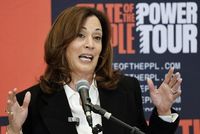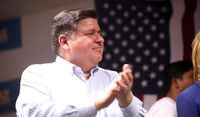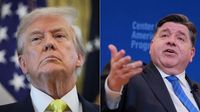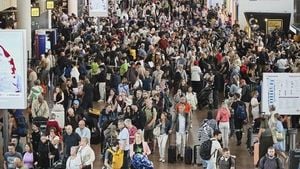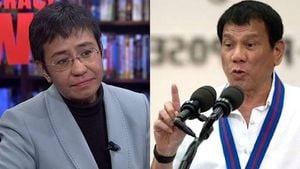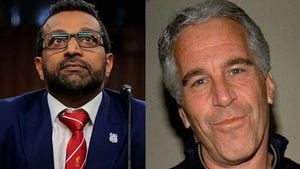As the 2028 U.S. presidential race looms on the horizon, the political landscape is already simmering with early maneuvering, sharp rhetoric, and deepening rivalries—none more apparent than the escalating feud between President Donald Trump and Illinois Governor JB Pritzker. Their public clashes are not only shaping the national conversation but also highlighting the internal dynamics and ambitions of both major parties as the next election cycle inches closer.
On August 8, 2025, Axios spotlighted the intensifying tensions between President Trump and Governor Pritzker, who is widely seen as a potential Democratic contender for the White House in 2028. The friction has been stoked by a series of policy disputes, political jabs, and, most recently, a stalled federal initiative aimed at protecting the Great Lakes from invasive species. The White House has openly conceded that the Brandon Road Interbasin Project—a $1 billion partnership between Illinois, Michigan, and the federal government to block Asian carp from entering the lakes—has ground to a halt, with Trump’s administration laying much of the blame at Pritzker’s feet.
According to Axios, administration officials have accused Pritzker of failing to engage with the president or respond to outreach efforts, a stark contrast to the ongoing cooperation from Michigan Governor Gretchen Whitmer, herself a rumored Democratic presidential hopeful. One administration source, closely involved with the U.S. Army Corps of Engineers, which is overseeing the project, remarked, “Gov. Whitmer has asked for support and showed an eagerness to engage on this critical project. Pritzker has not.” The source added, “President Trump stands ready to get this project back on track, but the governor of Illinois is going to have to show some effort to get things moving again.”
The stakes are high: Asian carp, an invasive species, have been steadily migrating northward, threatening to disrupt native fish populations and jeopardize the region’s lucrative recreational fishing, boating, and tourism sectors. The project, announced with fanfare in May when Trump signed a memorandum of support, was intended as a bipartisan effort to safeguard the lakes. Yet, as Axios noted, the White House claims that without Illinois’ full cooperation, progress has stalled on crucial funding, permitting, and environmental review issues.
Pritzker’s camp, however, vehemently disputes the administration’s narrative. Matt Hill, the governor’s spokesperson, pointed out that Pritzker hosted a high-profile meeting at the Brandon Road Lock and Dam in Joliet, Illinois, on July 24, 2025, bringing together Michigan officials and the Army Corps to discuss the project. Hill insisted, “Attendees shared positive updates on the progress we are making to protect the Great Lakes.” He didn’t mince words regarding the White House’s accusations, stating, “If Trump wants to try lying to play political blame games he can, but Illinois will focus on delivering results. If the White House needs an update on the project, we welcome their outreach but have not received any to date.”
The dispute over the Great Lakes project is just one flashpoint in a broader, ongoing battle. Pritzker has become a high-profile critic of Trump, regularly lambasting the administration’s actions and policies. He’s called Trump a “cheater” over the GOP’s aggressive congressional redistricting push, accusing the president of trying to “steal” seats in the U.S. House, where Republicans hold a slim majority heading into the 2026 midterms. Trump, for his part, has labeled Pritzker “probably the worst” governor “in the country” and has taken him to task for opposing his hardline immigration measures.
Beyond these headline-grabbing confrontations, Pritzker’s own political ambitions have come under scrutiny—sometimes from within his own party. In a commentary published on August 8, 2025, by RealClearPolitics, former Illinois state representative Mark Batinick argued that Pritzker’s overtures toward a 2028 presidential bid are costing him popularity at home. Batinick accused the governor of prioritizing national politics over state issues and adopting “radically progressive policies” to curry favor with the Democratic Party’s left wing.
Batinick’s critique was pointed: “The message is clear: JB Pritzker is trying to impress national Democratic activists while ignoring the real concerns of Illinois voters. But the polling suggests the voters are paying attention—and they’re not impressed.” He cited Illinois’ high gas and property taxes, despite Pritzker’s criticism of Trump-era tariffs as a “tax on working families,” and pointed to the expiration of the state’s school choice program, which had enabled roughly 10,000 students to attend better, safer schools. “Supporting school choice might be controversial with national union leaders, but it’s popular with Illinois parents—across the political spectrum,” Batinick wrote.
Batinick also highlighted Pritzker’s April 2025 speech in New Hampshire, where the governor encouraged mass protests and extreme political activism, as well as his support for allowing biological males to compete in girls’ and women’s sports—positions that may play well with national progressives but risk alienating moderate and conservative Illinoisans. Criticism was also leveled at Pritzker’s condemnation of Texas’ redistricting efforts, given his own approval of what Batinick called “one of the most egregiously gerrymandered maps in the country” for Illinois.
It’s not just critics who have noticed Pritzker’s national ambitions. Axios reported that the governor has been making moves typical of a White House aspirant: visiting early primary states like New Hampshire, giving national TV interviews, and setting up a political action committee. When announcing his 2026 campaign for a third term as governor, Pritzker took a not-so-veiled swipe at Trump, declaring, “Our story doesn’t have a cult telling us what to believe, or sycophants telling us what to say, or a king telling us what to do.”
Meanwhile, on the Republican side, Vice President JD Vance has been quick to tamp down speculation about his own presidential ambitions. During an August 8, 2025, meeting with British foreign minister David Lammy in Sevenoaks, England, Vance told reporters, “My view on the politics of 2028 is I’m not really focused even on the election in 2026, much less one two years after that. And if we do a good job for the American people, the politics will take care of itself.”
With both parties’ potential fields taking shape and high-profile figures like Pritzker and Vance staking out their positions—whether by engaging in public spats, courting national attention, or downplaying future ambitions—the stage is set for a contentious and unpredictable lead-up to 2028. The interplay of state and national politics, the tug-of-war between progressive and moderate forces, and the ever-present shadow of Trump’s influence all but guarantee that the coming years will be anything but dull.
As the dust settles on these latest confrontations, one thing is clear: the road to 2028 has already begun, and the rivalries, debates, and policy battles now unfolding will shape the choices facing voters in ways both expected and surprising.
